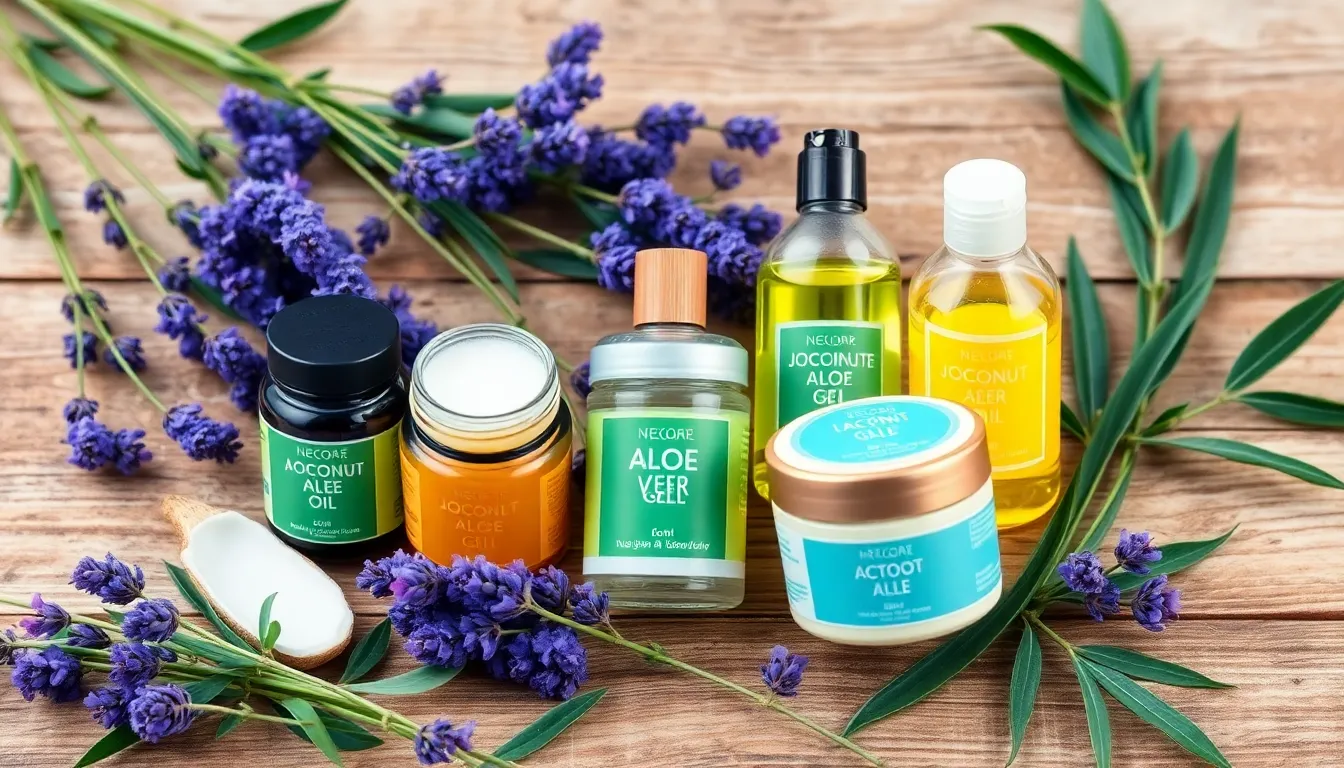In a world where beauty often comes with a side of guilt, vegan cosmetics are here to save the day—and your conscience. These products are not just cruelty-free; they’re like a party for your skin, filled with plant-powered goodness that leaves you looking fabulous without harming a single furry friend. Who knew that slathering on makeup could feel like a moral victory?
Table of Contents
ToggleOverview of Vegan Cosmetics
Vegan cosmetics represent a significant shift toward cruelty-free and sustainable beauty products. These items emphasize ethical standards and utilize plant-derived ingredients.
Definition of Vegan Cosmetics
Vegan cosmetics contain no animal-derived ingredients, including beeswax and lanolin. In addition, these products avoid animal testing during production. This commitment to non-animal usage ensures adherence to ethical practices in beauty. Some brands proudly display certifications that signify their vegan status.
Importance of Vegan Ethics
Vegan ethics play a crucial role in the cosmetics industry. Purchasing vegan cosmetics reflects a commitment to animal welfare and environmental sustainability. Companies that prioritize vegan formulations contribute to reduced animal suffering and promote ecological balance. By choosing these products, consumers support a movement that values ethical practices, encouraging more brands to adopt similar policies.
Key Ingredients in Vegan Cosmetics

Vegan cosmetics harness the power of natural ingredients, steering clear of any animal-derived substances. These products prioritize skin health and ethical values in their formulations.
Common Plant-Based Ingredients
Coconut oil serves as a popular moisturizer, providing hydration and a soft texture. Aloe vera soothes and heals skin, often found in gels and creams. Jojoba oil mimics skin’s natural sebum, making it an excellent choice for balancing oil levels. Shea butter delivers deep nourishment, known for its emollient properties that enhance skin elasticity. Finally, essential oils like lavender and tea tree offer fragrance and therapeutic benefits while ensuring decisions align with vegan principles.
Ingredients to Avoid
Animal-derived ingredients such as lanolin pose a concern for vegans, sourced from sheep’s wool. Carmine, a colorant derived from insects, also remains unsuitable, often found in lipsticks and blushes. Honey, while natural, comes from bees and contradicts vegan ethics, commonly used in face masks and scrubs. Additionally, silk proteins originate from silkworms, challenging the vegan standard in hair products. Consumers should always check labels for these ingredients to support their vegan lifestyle effectively.
Benefits of Vegan Cosmetics
Vegan cosmetics offer numerous advantages that enhance beauty while aligning with ethical values. Consumers increasingly prefer these products for their health benefits and environmental considerations.
Skin-Friendly Properties
Vegan cosmetics prioritize skin health, often incorporating natural ingredients like aloe vera and coconut oil. These components provide hydration and nourishment without harmful additives. Gentle on skin, vegan products target common concerns such as irritation and allergic reactions. Many formulations boast anti-inflammatory properties, promoting a healthier complexion. Ingredients such as shea butter and jojoba oil support skin barrier function, leaving skin soft and supple. Overall, vegan cosmetics cater to diverse skin types, ensuring beauty routines benefit from nourishing elements.
Environmental Impact
Vegan cosmetics significantly reduce environmental impact by avoiding animal-derived ingredients and testing methods. Their formulations typically emphasize plant-based sources, leading to less resource-intensive production. Many brands adopt sustainable practices, including eco-friendly packaging, which minimizes waste. Additionally, choosing vegan options contributes to the reduction of animal agriculture’s carbon footprint. Vegans often support cruelty-free brands that prioritize ethical sourcing and environmental stewardship. This conscious choice encourages a shift in the cosmetics industry towards more sustainable operations.
Popular Vegan Cosmetics Brands
Numerous brands prioritize ethical practices in the vegan cosmetics industry. These brands provide consumers with high-quality, cruelty-free options while promoting sustainability.
Established Brands
Prominent brands like Too Faced, e.l.f. Cosmetics, and Urban Decay lead the way in vegan cosmetics. Too Faced offers a wide range of cruelty-free makeup, favored for its bold colors and innovative formulas. e.l.f. Cosmetics is well-known for its affordability and quality, making vegan products accessible to a broad audience. Urban Decay, celebrated for its edgy and vibrant products, ensures all its items meet vegan standards. Their commitment to ethical sourcing enhances their brand reputation and appeals to socially conscious consumers.
Emerging Brands
Several emerging brands are gaining traction in the vegan cosmetics market. Bite Beauty focuses on natural ingredients and sustainable practices while creating high-performance lip products. 100% Pure prides itself on using fruit pigments for vibrant colors without harmful additives. Another notable brand, Thrive Causemetics, not only offers vegan cosmetics but also supports charitable causes. These emerging brands cater to customers seeking fresh, innovative products with a strong ethical foundation.
How to Choose Vegan Cosmetics
Choosing vegan cosmetics involves understanding labels and certifications. It’s essential to ensure products align with vegan principles.
Reading Labels
Reading labels helps identify animal-derived ingredients. Look for terms like lanolin, carmine, honey, and silk proteins, which indicate non-vegan content. Ingredients derived from plants are a sign of vegan products. Familiarity with common vegan ingredients, such as coconut oil, aloe vera, and shea butter, aids in making better choices. Always check for phrases like “cruelty-free” or “not tested on animals” as that reflects ethical practices. Understanding these aspects contributes to informed purchasing decisions.
Certifications to Look For
Certifications provide assurance of a product’s vegan status. Seek labels from recognized organizations like The Vegan Society or PETA. These certifications confirm that no animal cruelty occurred during production. Brands with these certifications often follow strict guidelines to ensure ethical sourcing. Third-party assurance enhances trust in a product’s claims. Moreover, opting for certified vegan cosmetics supports a broader movement advocating for animal welfare and environmental sustainability. Consumers can feel confident choosing products with visible certifications.
Choosing vegan cosmetics is more than just a beauty decision; it’s a commitment to ethical practices and sustainability. By opting for products free from animal-derived ingredients and harmful testing methods, consumers support a movement that prioritizes animal welfare and environmental health.
The range of high-quality vegan brands available today makes it easier than ever to find products that align with personal values. With a focus on natural ingredients and cruelty-free practices, these cosmetics not only enhance beauty but also promote skin health.
As awareness grows, the demand for vegan cosmetics continues to rise, encouraging more brands to adopt ethical practices. Every purchase contributes to a more compassionate and sustainable future in the beauty industry.



